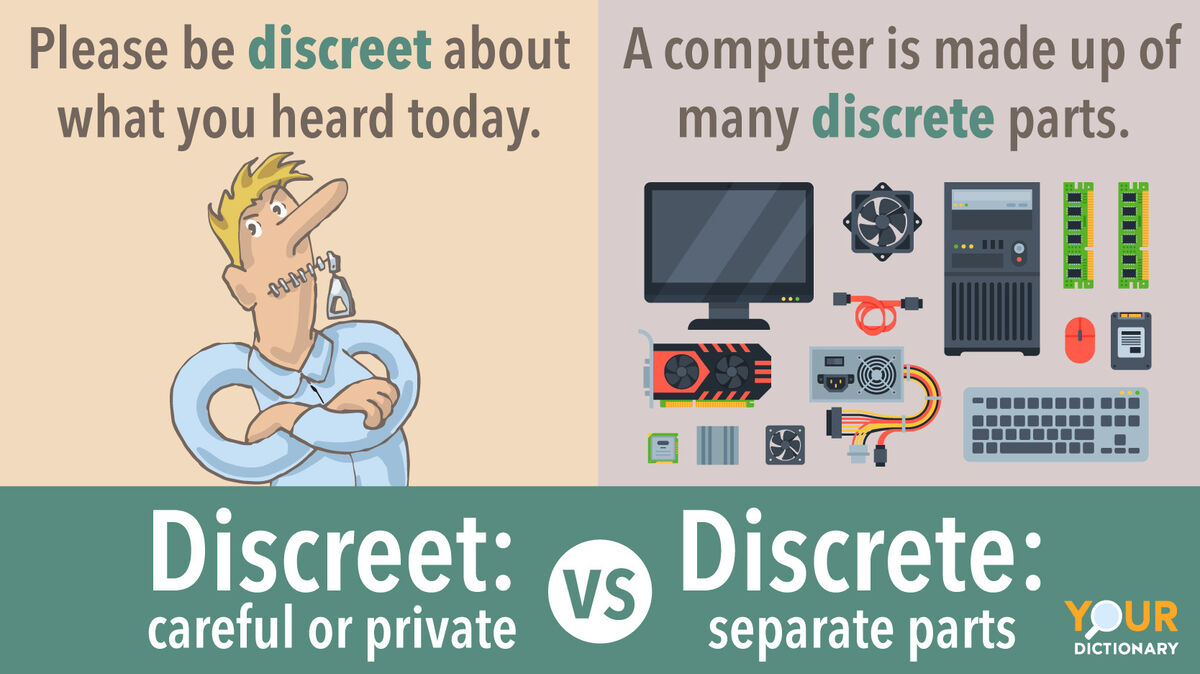
When you keep a secret, are you being discreet or discrete? Are these two different words, or is one just spelled incorrectly? Learn how to use discreet vs. discrete in a sentence, and decide which word you really want to use.
The Difference Between Discreet and Discrete
The adjectives discreet and discrete are homophones, which means that they sound the same but have different meanings and spellings. Their main difference is in their definitions:
- discreet - careful, private
- discrete - separate, unconnected
When you keep a secret to avoid hurting someone's feelings, you're being discreet. When you sound out a word by its syllables, you've divided the word into discrete parts.
Tips to Remember Discreet vs. Discrete
Even though the words discreet and discrete aren't commonly used in conversation, you want to be sure you're using the correct one when you need it. A few tips to remember the differences between them are:
- If you're being discreet, you may need to creep past someone. The "creet" from discreet is similar to "creep."
- A discreet person doesn't make a peep. Both words have two e's.
- The "t" in discrete divides the e's into two equal, disconnected sections.
- Discrete and concrete have the same endings, and you can divide concrete into pieces.
How to Use Discreet
Both discreet and discrete have the same letters as the word secret, which leads to confusion about their meanings. But only discreet describes a person who doesn't draw attention to themself. Its antonym, indiscreet, describes a person who doesn't keep anything private.
Examples of discreet in a sentence include:
- Please be discreet about our plans to start a new business.
- Kelly and her husband shared a discreet glance when the neighbor started complaining.
- Even though the Martins were wealthy, they bought a small, discreet house in the mountains.
- Aunt Polly said I could have a cookie if I could be discreet about it.
- James was discreet about his math test because he didn't want to brag.
How to Use Discrete
The word discrete describes items or concepts that are separate and not related to each other. Discrete motor skills, for example, are single units of activity with short durations (such as throwing or catching a ball). In linguistics, the consonant sounds /b/ and /p/ are discrete sounds that are not connected to each other.
Additional examples of the word discrete include:
- You can teach a child to sound out a word by dividing it into discrete syllables.
- A couple of discrete skills needed to play soccer include kicking and passing.
- The neighborhood is divided into four discrete communities.
- Driving a car involves many discrete movements, such as shifting gears and pressing the brake pedal.
- The bedroom, bathroom and kitchen are three discrete areas of my house.
Word Origins of Discreet and Discrete
If these words are so different, why do they sound so similar? The answer lies in their Latin root discretus, past participle of discernere ("to separate"). The Latin term entered English as discrete, while an Old French version of the word became discret (later discreet). Both words are loosely connected to discern, another English word from discernere that means "to distinguish or recognize."
Don't Be Discreet About Your Vocabulary Skills
Even experienced grammarians struggle with tricky word pairs such as discreet and discrete. But straightening out these vexing vocabulary puzzles is an important part of developing your writing skills! Once you're ready for another challenge, see if you can tell the difference between systemic vs. systematic.